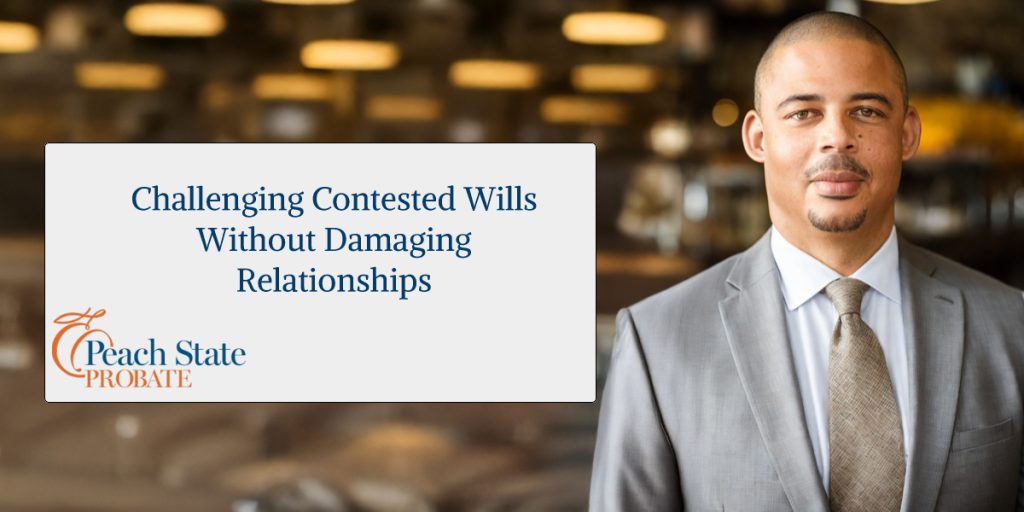## Navigating Contested Wills: Preserving Relationships While Challenging Legal Definitions
Contested wills can create emotionally charged situations within families, often leading to strife that can alter relationships forever. In navigating these disputes, it is crucial to approach the situation with an understanding of the emotional landscape and the legal complexities involved. The objective should not just be to challenge a will but to do so in a way that minimizes damage to personal relationships, fostering a resolution that all parties can accept or at least tolerate. By keeping communication open and prioritizing understanding over aggression, individuals can maintain familial bonds while addressing their legal rights concerning contested wills.
The distinction between challenging a will and engaging in adversarial legal battles is often where many individuals falter. It is essential to understand that while a contested will often centers around disagreements regarding intentions or validity, the approach taken in addressing these issues can greatly influence future family dynamics. Misdirected anger or accusations can lead to long-lasting rifts that are difficult to mend, but a strategy that emphasizes cooperation and mediation can preserve family ties.
The landscape of contested wills in Georgia is one characterized by various legal considerations. Factors such as the grounds upon which a will can be contested, including lack of capacity, undue influence, improper execution, or fraud, frequently play a pivotal role. However, while it is important to understand the legal nuances, it is equally vital to recognize the emotional implications that these disputes can have on individuals and families at large.
## Understanding Contested Wills: Definitions and Implications
Contested wills arise when beneficiaries or potential heirs dispute the validity of a will or the intentions expressed within it. A will may be challenged for various reasons, including claims regarding the decedent’s mental capacity at the time of drafting, allegations of undue influence by beneficiaries, or concerns surrounding the authenticity of the document itself. Each of these claims has specific legal requirements that must be met to sustain a challenge successfully.
The legal definition of a contested will can vary based on jurisdiction, and in Georgia, it’s particularly important to understand the grounds recognized in probate court. The law allows for beneficiaries to contest a will if they can present substantial evidence supporting their claims. These legal provisions are designed to protect the rights of those who may feel wronged by the decedent’s final wishes and ensure the integrity of the estate management process.
Challenging a will can have substantial implications not only for the validity of the document itself but also for the relationships of those involved. Individuals who choose to engage in this challenging process must assess the potential for conflict within their family framework and consider the impact on their long-term relationships with other heirs, beneficiaries, and relatives.
## The Importance of Addressing Contested Wills
Addressing contested wills is essential for both legal and emotional reasons. Firstly, there are legal obligations that families must honor, including the decedent’s last wishes as articulated in their will. Failing to address disputes professionally and systematically can lead to prolonged litigation, which can drain resources and exacerbate familial rifts. Moreover, unaddressed feelings of betrayal or misunderstanding can linger, impacting relationships for years to come.
Secondly, this topic matters from a psychological perspective. Navigating death and inheritance often surfaces complex emotions such as grief, anger, and guilt. When individuals feel that their rights or expectations have been subverted, the emotional fallout can hinder family members’ ability to communicate and grieve effectively. A holistic and empathetic approach to contested wills allows families to move forward, mitigate trauma, and find common ground in difficult times.
Lastly, the expertise of a legal professional specialized in estate disputes can streamline the process, helping to position heirs positively. Legal counsel can help elucidate intentions and ensure that appropriate measures are taken to reach equitable resolutions without compromising family dynamics further. This is where seeking professional help to address contested wills can significantly support families in maintaining cherished relationships while navigating legal complexities.
## Legal Framework Surrounding Contested Wills
Understanding the legal framework surrounding contested wills is paramount for anyone contemplating challenging a will. In Georgia, specific statutory provisions lay the groundwork for how a will can be contested. The law explicitly identifies several grounds for contesting a will; these include but are not limited to a lack of capacity, undue influence, fraud, and improper execution. Each of these grounds has distinct legal parameters, and knowing them can significantly affect the decision to challenge a will.
One essential aspect of the legal framework is the burden of proof. The individual contesting the will typically bears the burden of demonstrating, with clear and convincing evidence, that the will should not be recognized as valid. This legal responsibility is significant; as such, preparation and a sound understanding of relevant laws are crucial factors in the outcome of contested wills.
Moreover, in Georgia, the probate courts provide a structured forum to hear these disputes. Court procedures can be quite intricate, requiring individuals to navigate deadlines, documentation requirements, and legal standards. Engaging in this process without comprehensive knowledge could harm the success of the challenge and potentially damage familial ties. Thus, being informed and strategic is a must for those who find themselves involved in these legal proceedings.
## Real-World Scenarios Involving Contested Wills
Real-world examples provide great insight into how contested wills unfold and the issues they can create. Consider a situation where a family member believes they were unfairly left out of a will due to the influence of another relative. In this case, emotions run high, making it challenging to maintain open lines of communication. Such instances may lead to legal challenges that can escalate quickly into a contentious family battle, risking long-lasting consequences on relationships.
In another example, a sibling may contest a will claiming that their sibling was not of sound mind when they executed the document. The case may lead to a prolonged legal dispute where family anecdotes and expert testimony about the decedent’s mental state may come into play. As these disputes grow, they often become less about the inheritance itself and more about family history, trust, and emotional scars that can take generations to heal.
Additionally, the way individuals approach these matters legally can significantly impact family relationships. Mediation or alternative dispute resolution approaches can sometimes lead to more amicable negotiations, preserving relationships over drawn-out court fights. The choice of how to dispute contested wills can depict a family’s willingness to collaborate or create further divisions. Realizing that the approach taken can be as influential as the legal arguments themselves underscores the complexity of family dynamics in estate disputes.
## Actions You Can Take When Facing Contested Wills
When grappling with contested wills, there are proactive measures individuals can undertake to address their concerns effectively while safeguarding relationships. The first step often involves gathering accurate information regarding the will itself, including understanding its execution process and the intentions communicated by the decedent. Clarity on these general points can guide individuals in evaluating whether pursuing a legal challenge is warranted.
Establishing open communication with family members can also play a pivotal role in addressing contested wills. Initiating discussions regarding concerns may allow for collaborative resolutions, potentially avoiding formal disputes. Encouraging a family meeting to discuss the will and the relevant emotions can foster a sense of transparency and commitment to harmony, often alleviating fears or misconceptions that many family members harbor about each other’s intentions.
If informal discussions don’t yield satisfactory results, the next step may involve consulting a legal professional to assess the feasibility of contesting the will. Legal representation can provide clarity on the steps necessary to protect individual rights and help navigate the complexities of probate law. Additionally, enlisting a mediator can ensure that discussions remain structured and focused, further enhancing the chances of a resolution that preserves relationships.
## Avoiding Common Pitfalls in Contested Wills
When engaging with contested wills, avoiding common mistakes can prove critical for preserving familial relationships and achieving favorable legal outcomes. One of the pervasive errors is failing to communicate effectively within the family. Many individuals may leap directly into legal challenges without attempting to resolve issues through conversations. This jump to litigation can exacerbate tensions and lead to bitterness, making reconciliation far more difficult down the line.
Another frequent mistake involves overlooking the emotional weight such disputes carry. The inclination to focus solely on legal standing can lead to an imbalance that neglects the feelings of other family members. Recognizing that emotional well-being is closely intertwined with legal intricacies can contribute to more holistic problem-solving approaches, allowing families to address both legal and emotional concerns simultaneously.
Inadequate documentation can also represent a significant pitfall in challenging a will. Whether it involves witness statements or evidence of the decedent’s capacity, ensuring proper collection and maintenance of relevant information is crucial. Engaging legal counsel experienced with contested wills can aid in assembling necessary documentation, thus avoiding the pitfalls that could undermine a challenge.
## When to Seek Legal Counsel for Contested Wills
Recognizing the right moment to consult legal counsel is crucial in the context of contested wills. Often, early intervention can lay the groundwork for a smoother resolution. If suspicions arise about the validity of a will or if a family member expresses intentions to contest its legitimacy, reaching out to a knowledgeable attorney is advisable. Having an experienced professional guide individuals through the complexities of the law can ease anxiety and facilitate informed decisions.
Another consideration for seeking legal counsel is when familial discourse becomes hostile or unproductive. If attempts to discuss or resolve issues escalate into conflict, the situation may necessitate professional guidance to mitigate further destruction of relationships. Legal counsel not only provides necessary expertise but can also serve as a mediator, helping steer conversations back towards positive resolutions.
Lastly, when navigating the courtroom becomes inevitable, having legal representation is vital. A seasoned attorney can provide pivotal support in managing court procedures, filing documentation accurately, and establishing a strong case. By engaging with an attorney at this critical juncture, individuals can ensure that their rights are protected while striving for a resolution that honors both their legal and emotional considerations regarding contested wills.
## The Benefits of Having Legal Representation in Contested Wills
Having legal representation during the challenges associated with contested wills can offer numerous benefits that are indispensable to achieving satisfactory outcomes. Firstly, an attorney brings a wealth of knowledge regarding estate law and specific local probate regulations. Their understanding of the legal environment allows individuals to navigate complex procedures correctly and effectively, minimizing the risk of costly mistakes or missed deadlines.
Additionally, legal representation can significantly enhance negotiation power. An attorney skilled in the nuances of contested wills can facilitate mediation or negotiations, ensuring that all parties are heard and understood, thereby fostering an environment that can lead to amicable solutions. The presence of legal counsel may also mitigate emotional charges inherent in disputes, allowing family members to approach conversations more rationally.
Lastly, the support of legal representation means that clients can strategize based on evidence and law rather than speculation or emotion. By having a reliable advocate who can analyze the situation objectively, individuals engage in informed decision-making, which overshadows knee-jerk reactions often prompted by stress and heightened emotions. The balance of legal clarity and personal insight afforded by legal representation greatly supports clients in addressing contested wills harmoniously.
## How Peach State Probate Can Support You in Contested Wills
At Peach State Probate, specialized understanding of the intricacies surrounding contested wills sets the firm apart in delivering solutions that prioritize both legal rigor and personal relationships. Our approach focuses on transparent communication with clients, ensuring they understand their rights, responsibilities, and the potential implications of their legal choices. Cultivating a relational atmosphere is instrumental in maintaining rapport during what can often be an emotionally charged experience.
The attorneys at Peach State Probate place significant emphasis on exploring amicable resolutions through alternative dispute resolution methods. We believe that mediation and negotiation can often yield more favorable results than protracted litigation, preserving family relationships in the process. By engaging in open conversations and guiding clients through sensitive discussions, we aim to achieve outcomes that honor both the decedent’s intentions and the beneficiaries’ rights.
Moreover, our comprehensive services provide clients with the necessary resources for navigating contested wills. From thorough documentation processes to strategizing for court presentations, Peach State Probate stands ready to uphold our clients’ interests with dedication and professionalism. Our objective is not just to resolve legal disputes, but to empower families as they navigate challenging times, fostering a future built on understanding and support.
## Frequently Asked Questions About Contested Wills




